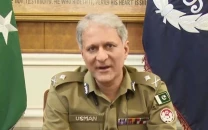Doctors provide fasting tips to diabetes patients
Suggest patients prepare for Ramazan by devising individual dietary plans

PHOTO: HUFFINGTON POST
This was suggested during a seminar “Roza aur Sehat” (Fasting and health) organised by the Shifa International Hospital (SIH) on Tuesday.
During the seminar, SIH Consultant Endocrinologist Dr Osama Ishtiaq stated that approximately 4.6% of all Muslims worldwide were diabetic or around 50 million who observe fasting during the month of Ramazan.
While fasting, Muslims are required to refrain from eating, drinking, using medications and smoking from dawn until sunset.
However, Dr Isthiaq noted that there were exemptions from fasting if people are sick, or if fasting may affect their health. Diabetes patients who fast risk an assortment of complications, including hypoglycemia (low blood sugar), postprandial hyperglycemia (the liver does not stop making sugar after having a meal), and other metabolic complications associated with dehydration.
Not so fast, say doctors Diabetics can enjoy Ramazan
Nevertheless, a large number of people with diabetes who still choose to fast during Ramazan despite the advice of their doctor, and the permission received from religious authorities create medical challenges for themselves and their health-care providers.
Dr Ishtiaq stated that it was important for patients with diabetes, who wish to fast during Ramazan, to prepare for the gruelling task. He added that fasting was very challenging for people living with diabetes, particularly those patients who suffer from type-1 diabetes and are dependent on insulin.
“It is important to individualise each patient’s management plan depending on their diet and lifestyle, medications, risk of hypoglycemia, and glycemic control, and to minimise the complications associated with fasting,” he said.
He suggested that patients must continue their diabetes medicine as per the advice of their doctor regarding dosage and timings.
“Control your diabetes for two months prior to Ramadan bringing HbA1c to less than eight and continue a diabetic diet during Iftaar and Sahur," Dr Ishtiaq added.
SIH Senior Clinical Dietitian Zainab Ghayyur advised patients to monitor their blood glucose levels regularly during the fast, especially in the first few days of Ramazan.
Published in The Express Tribune, May 1st, 2019.


















COMMENTS
Comments are moderated and generally will be posted if they are on-topic and not abusive.
For more information, please see our Comments FAQ